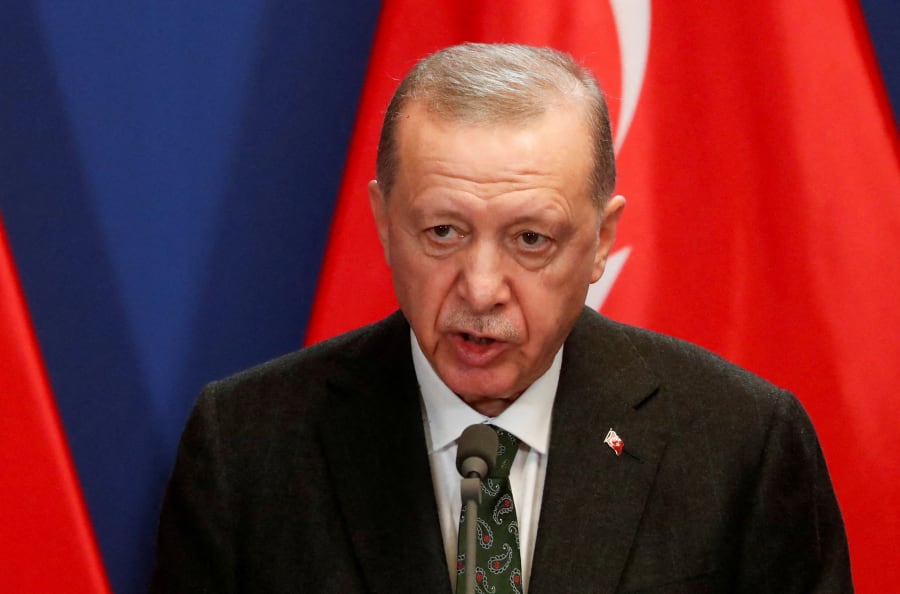After ICJ ruling: Outrage and relief in Israel, Hamas and Erdoğan celebrate
Israeli judge who survived Holocaust: ‘Genocide more than just a word for me’

In the aftermath of the eagerly awaited provisional ruling of the International Court of Justice (ICJ) in South Africa's genocide case against Israel, Israeli officials reiterated their outrage at the accusation while showing relief that the court didn’t order an immediate stop to the war.
The ICJ on Friday ordered Israel to take several measures to ensure the rights of the Palestinians in Gaza but didn’t accede to the South African government's demand to issue an injunction that would stop Israel’s war effort.
The announcement of the court’s decision on Saturday, the day before International Holocaust Remembrance Day, caused many to draw a connection between the accusation of genocide leveled against the Jewish state, and the historical event which gave rise to the Genocide Convention in the first place.
Justice Aharon Barak, who represented Israel at the ICJ’s panel of judges, wrote in his statement, “The idea that Israel is now accused of committing genocide is very hard for me personally, as a genocide survivor deeply aware of Israel’s commitment to the rule of law.”
It is “doubtful whether South Africa brought this dispute in good faith,” Barak added, noting that when South Africa began to criticize Israel’s conduct in the Gaza Strip: "Israel replied with an offer to engage in consultations at the earliest possible opportunity. South Africa, instead of accepting this offer, which could have led to fruitful diplomatic talks, decided to institute proceedings against Israel before this Court.”
Israeli Prime Minister Benjamin Netanyahu stated there was “no greater absurdity” than to discuss accusations of Israeli ‘genocide’ on Holocaust Remembrance Day.
Following the court's decision, Netanyahu instructed his ministers to hold off on public responses until the government had decided on an official policy in the coming days.
On Friday afternoon, shortly before Shabbat, the prime minister stressed: “Israel’s commitment to international law is unwavering. Equally unwavering is our sacred commitment to continue to defend our country and defend our people.”
Calling the charge of genocide false and outrageous, he said: “On the eve of the International Holocaust Remembrance Day, I again pledge as Prime Minister of Israel - Never Again. Israel will continue to defend itself against Hamas, a genocidal terror organization.”
“On October 7th, Hamas perpetrated the most horrific atrocities against the Jewish people since the Holocaust, and it vows to repeat these atrocities again and again and again…We will continue to facilitate humanitarian assistance, and to do our utmost to keep civilians out of harm’s way.”
Defense Minister Yoav Gallant said Israel had “no need to be lectured on morality… Those who seek justice, will not find it on the leather chairs of the court chambers in The Hague.”
“Those who seek justice, will not find it in the operational plans found in the pockets of Nukhba terrorists, who were instructed to ‘drink the blood of the Jews.’They will find it in the ‘Spirit of The IDF,’ a document that outlines the values and conduct of our moral and professional soldiers,” Gallant added.
Israel’s Foreign Ministry made an official statement, arguing that the court’s decision “does not determine whether South Africa’s claims have any merit, or the Court’s jurisdiction in this matter.”
The foreign ministry also welcomed the ICJ’s “clear demand for the immediate and unconditional release of all the hostages held in Gaza.”
“Israel’s commitment to international law is unwavering. It exists independently of any ICJ proceedings, as does Israel’s inherent right to defend itself… I reiterate this today on the eve of International Holocaust Remembrance Day,” said Israeli Foreign Minister Israel Katz.
While Barak agreed with two out of five measures the court imposed on Israel, only one other ICJ judge rejected the court’s findings.
In her dissenting opinion, Justice Julia Sebutinde from Uganda argued that “South Africa has not demonstrated, even on a prima facie basis, that the acts allegedly committed by Israel and of which the Applicant complains, were committed with the necessary genocidal intent, and that as a result, they are capable of falling within the scope of the Genocide Convention.”
Uganda’s representative at the United Nations distanced the country from Sebutinde and expressed support “for the plight of the Palestinian people.”
Many of Israel’s enemies and detractors praised the court’s decision despite it not ordering a cessation of hostilities, as many had hoped.
Foremost among them, Hamas officials put out a statement “welcoming” the ICJ’s comments, taking Israel to task for causing widespread destruction in the Gaza Strip and ordering it to do more to protect civilians.
The Hamas terror group also stated it is awaiting the court’s final decision to condemn Israel for “war crimes” and “crimes against humanity.”
Earlier on Friday, Hamas declared it would accept the court’s orders. Since announcement, however, the terror group has so far not commented on the ICJ’s call to release the Israeli hostages.
Alongside Hamas, Turkey’s President Recep Tayyip Erdoğan also praised the court’s provisional measures describing them as “valuable.”
“We hope that this decision, which is binding on the countries party to the Genocide Convention, will lead to an end to Israel’s indiscriminate attacks against women, children and the elderly,” Erdoğan said.
On Thursday, the Turkish president said his country would make every effort to ensure Israel’s “appropriate punishment” in the ongoing genocide case.

The All Israel News Staff is a team of journalists in Israel.













